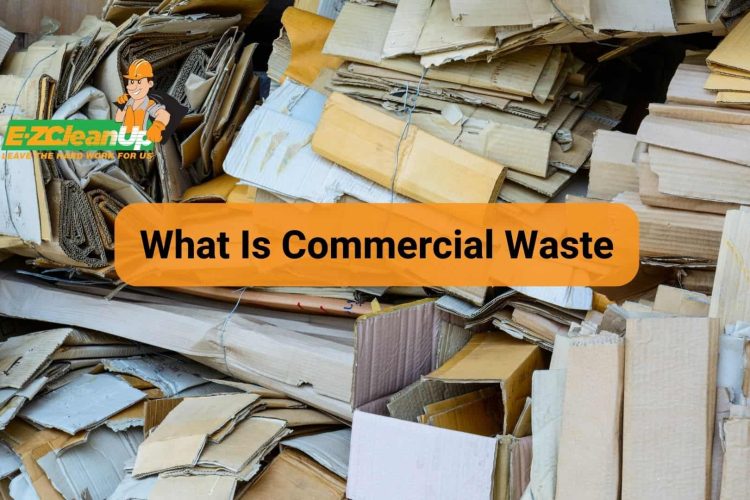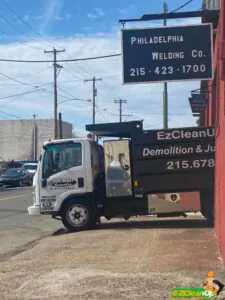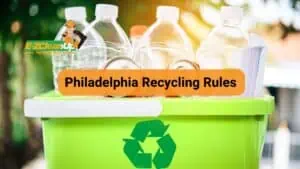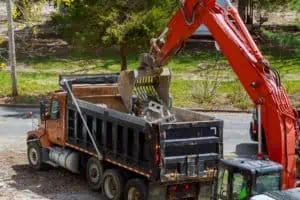Commercial waste refers to the waste generated by businesses and commercial activities. This includes waste from offices, shops, factories, and other business-related operations. It can consist of a wide range of materials such as paper, cardboard, plastics, metals, glass, and food waste.
Discover more about what is commercial waste and why it is important for businesses to learn how to manage it efficiently in our comprehensive guide.
Where Does Commercial Waste Come From?
You’ll find commercial waste in various places. It’s not just about the paper and packaging in offices and stores. There’s more to it. Construction sites contribute significantly. They produce waste like scrap materials and unused resources. Restaurants and food businesses add to the mix with food waste.
Then, there are hazardous materials from different industries. The waste from stores, offices, and warehouses is more than just trash; it’s a byproduct of their operations. These are the common sources we often overlook, yet they play a massive role in the total waste we need to manage.
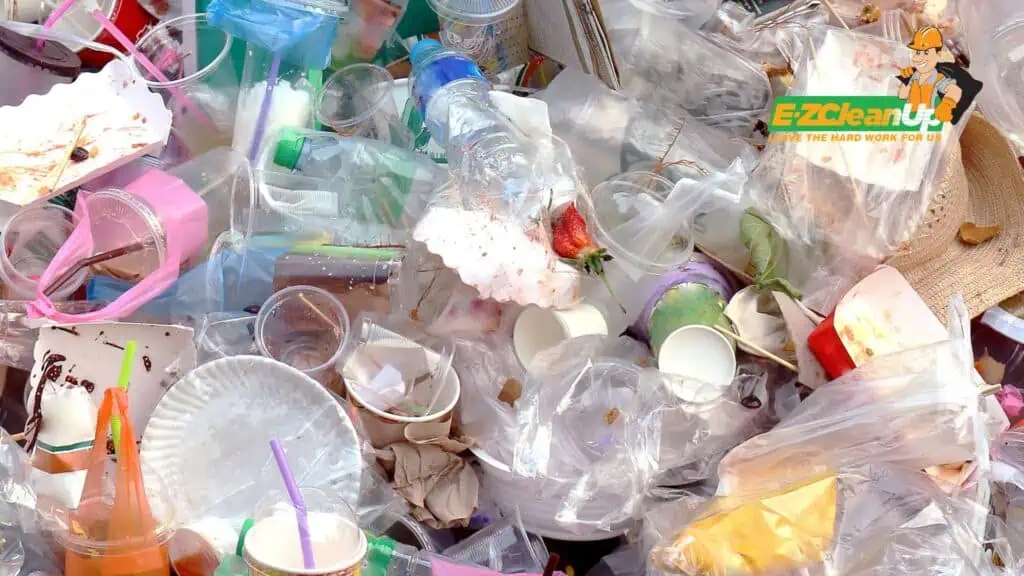
Why Knowing About Commercial Waste Matters
It makes up a large part of the total waste we generate each year. And it’s not just about the quantity. Improper disposal can hurt the environment and public health. Imagine harmful materials leaking into our soil and water.
That’s a risk we can’t take. Also, there are rules about disposing of this waste. Businesses need to follow these to avoid penalties. It’s their responsibility.
Categories of Commercial Waste
Here are the common categories of commercial waste:
Solid Waste in Business Settings
In the business world, solid waste is a common sight. This includes things like food waste, nappies, and even construction debris. These are typically non-recyclable and end up in landfill sites.
It’s crucial to understand that managing this waste efficiently is key to minimizing environmental impact. Businesses need to be aware of the amount of solid waste they produce and look for ways to reduce, reuse, or recycle wherever possible.
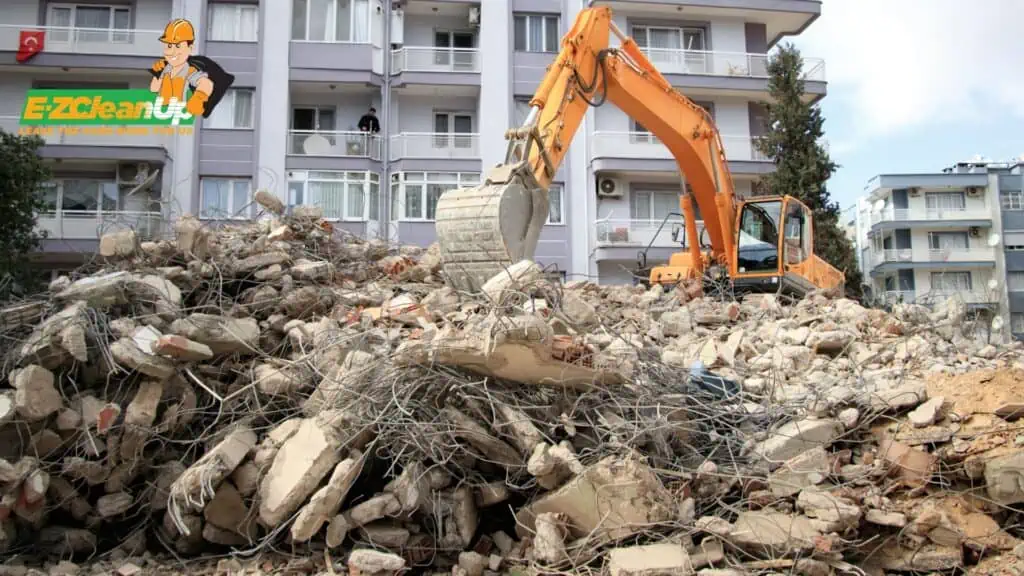
Hazardous Materials in Industries
Hazardous waste is about those chemical wastes that are flammable, corrosive, toxic, or reactive. We’re looking at a range of wastes from industrial processes. The disposal of this type of waste is not straightforward. There are strict rules that govern it.
Why? If mishandled, it poses significant risks to human health and the environment. Industries must handle this waste with the utmost care, following the necessary procedures to ensure safe disposal. This is non-negotiable. The safety of our environment and communities depends on it.

E-Waste in Modern Commerce
Electronic waste, or e-waste, is a growing concern. It’s those unwanted or broken electronic items from our offices and retail spaces. Think computers, TVs, printers, and mobile phones. Why worry about e-waste? It’s because these items contain toxic substances.
They can’t be tossed in with the general trash. The disposal of e-waste requires special handling to prevent environmental damage. It’s about being responsible with our technology. As we move towards a more digital world, the need to manage e-waste effectively becomes even more critical. It’s an environmental responsibility we can’t ignore.
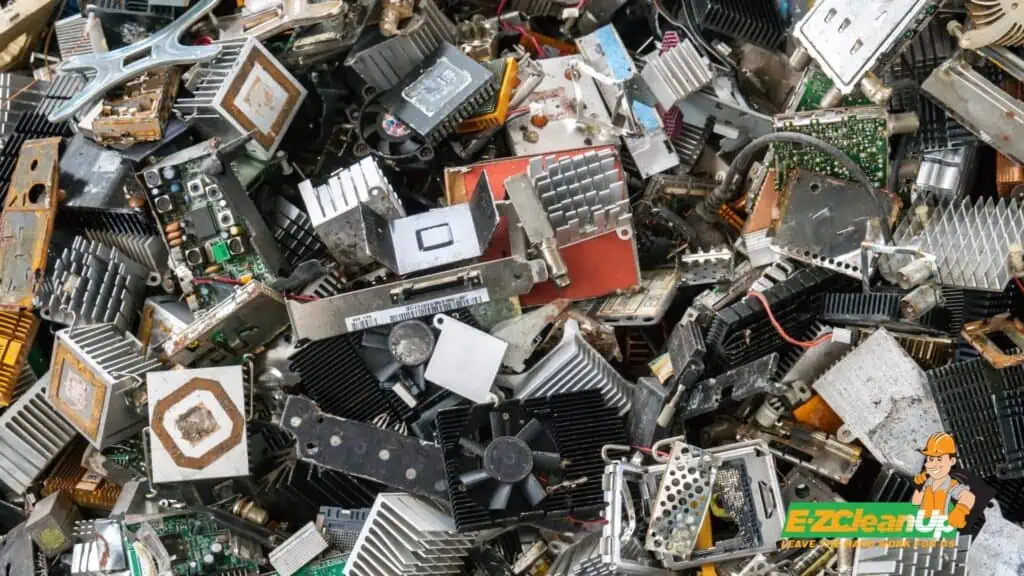
A Look into the Legalities in Waste Management
In the U.S., managing waste isn’t just a matter of throwing things away. There are laws to follow. Take California, for instance. They’re strict about recycling. Businesses and even apartment buildings have to recycle, and that includes organic waste like food scraps.
Then there’s the federal level, where the Environmental Protection Agency (EPA) steps in. They oversee solid and hazardous waste management under the Resource Conservation and Recovery Act (RCRA).
This act is all about protecting the public and the environment from the dangers of waste disposal. It also focuses on saving energy and reducing waste. These rules are in place for a reason: to keep our communities and environment safe.
What Businesses Must Do
Businesses need to stay sharp about waste disposal laws. These rules aren’t just suggestions; they’re requirements. And they can vary from state to state. Different types of waste might have different regulations. A business in one state might have a different set of rules to follow than a business in another.
Ignoring these regulations is a bad idea. We’re talking about hefty fines and more. It’s not worth the risk. Non-compliance sends the message that a business doesn’t care about its community or the environment. That’s not the reputation any business wants. Staying compliant isn’t just about following the law; it’s about doing the right thing.
Commercial Waste’s Environmental Effects
When businesses dispose of waste improperly, it doesn’t just disappear. It can damage ecosystems and harm plants and animals. It also poses a threat to our soil and water sources. Soil contamination can disrupt our food supply, and polluted water affects our health and the health of marine life.
Air Quality Concerns
The way we manage commercial waste also impacts air quality. Incorrect disposal methods can release harmful substances into the air. Air pollution can lead to respiratory problems like asthma. But it’s not just about what we breathe in. Improper waste management contributes to greenhouse gas emissions.
These emissions play a significant role in climate change. It’s a chain reaction. One poor waste management decision can contribute to a larger environmental problem. This makes responsible waste handling an even more pressing issue.
Role in Climate Change
Climate change is a global challenge, and commercial waste management plays a role in this. Waste prevention and recycling are more than just good practices; they’re crucial to reducing greenhouse gas emissions.
When waste isn’t managed properly, it can lead to untreated waste polluting the air, soil, and water. This contributes to climate change. It’s a cycle. By reducing, recycling, and responsibly disposing of waste, businesses can help combat the adverse effects of climate change.
Strategies for Effective Waste Management
Here are the strategies that businesses must adapt to implement effective waste management:
Reducing Waste
Businesses can look at their current practices and find ways to produce less waste. For instance, encouraging employees to print less and use double-sided printing can significantly cut down on paper waste. It’s about making small changes that add up. By reducing the amount of waste generated in the first place, organizations can also save on disposal costs.
Embracing Recycling and Repurposing
Recycling is about diverting waste from landfills and finding new life for materials. A solid recycling program helps lower waste disposal costs and reduces the environmental impact. The key is to analyze waste production.
This analysis can reveal opportunities to cut back on waste and improve recycling efforts. It’s about turning waste into a resource. By reusing materials, businesses can reduce their environmental footprint and contribute to a circular economy.
Utilizing Advanced Disposal Methods
Advanced disposal technologies, like waste-to-energy and landfill gas recovery, are changing the game in waste management.
These technologies not only help in managing waste better but also contribute to renewable energy production:
- Waste-to-Energy: It converts waste into usable energy, reducing landfill dependency.
- Landfill Gas Recovery: It captures methane from landfills and turns it into energy.
Economic Impact of Commercial Waste Management
Dealing with commercial waste comes with a price tag. For businesses, managing waste means spending on collection, transport, and disposal. These are necessary expenses, but they can add up.
It’s not just about getting rid of waste; it’s about doing it in a way that complies with regulations and is environmentally responsible. Businesses need to consider these costs as part of their operational expenses. The challenge is to manage these costs without compromising efficiency or environmental responsibilities.
On the flip side, efficient waste management can bring significant economic benefits:
- It can lower operating costs.
- Less waste means lower disposal fees.
- There’s also the job creation aspect. The recycling and reuse industries are growing and offer new employment opportunities.
- Then, there are savings on waste disposal costs. Businesses can save money and even boost their bottom line by focusing on waste reduction and recycling.
The waste management and recycling industries are on the rise. There’s a growing demand for innovative solutions to handle waste more effectively. This demand drives growth in these sectors. As businesses strive to reduce their environmental impact, they turn to these industries for solutions. This means more jobs, more innovation, and more opportunities.
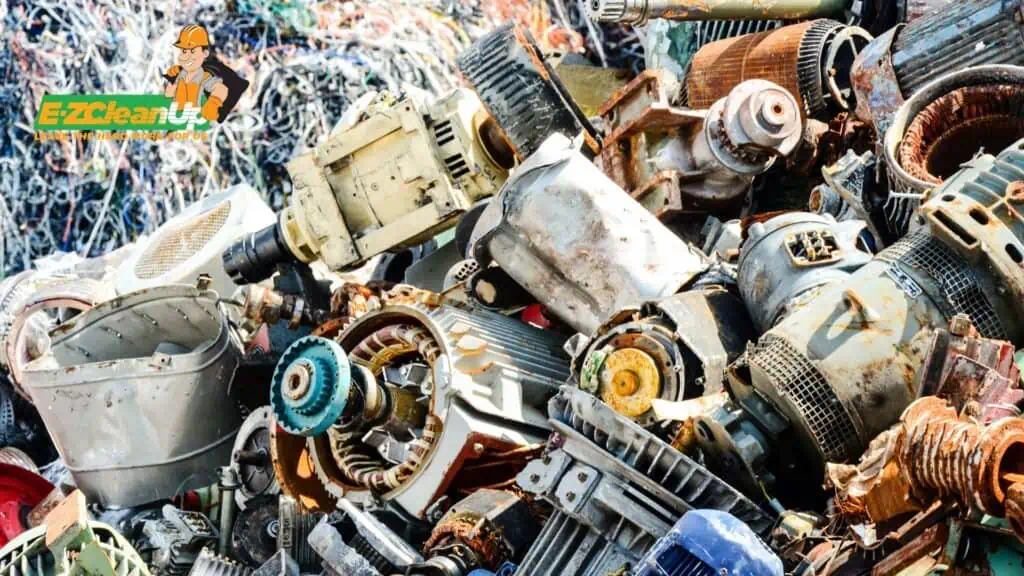
Advancements in Waste Solutions
Innovation in waste processing and recycling is changing the game. We’re seeing groundbreaking solutions in waste decomposition and recycling techniques. The focus isn’t just on getting rid of waste; it’s about doing it smarter.
For example, once a neglected aspect, food waste is now a key topic in waste management discussions. These innovations are driving the industry towards more efficient and environmentally friendly practices. It’s not just about technology; it’s about thinking differently and finding new ways to handle waste.
Technology is playing a crucial role in waste reduction. The advancements in waste and recycling technology have been significant. We’re talking about smart systems that help manage waste more effectively. This includes everything from better sorting techniques to more efficient recycling processes.
Importance of Consumer Awareness
As consumer awareness about sustainability grows, the demand for tech-driven waste solutions increases. This trend is pushing the industry towards smarter, more sustainable practices. It’s a shift that’s is beneficial for the environment and it’s what consumers are increasingly expecting from businesses.
On a global scale, there’s been a shift in waste management policies and initiatives. Governments and international organizations are stepping up their game. We’re seeing more regulatory measures, including extended producer responsibility. This means businesses are being held accountable for the waste they produce, from creation to disposal.
It’s a move towards more responsible waste management practices on a global level. These policies are shaping the future of waste management, pushing industries towards more sustainable practices. It’s a global effort to manage waste more responsibly and sustainably.
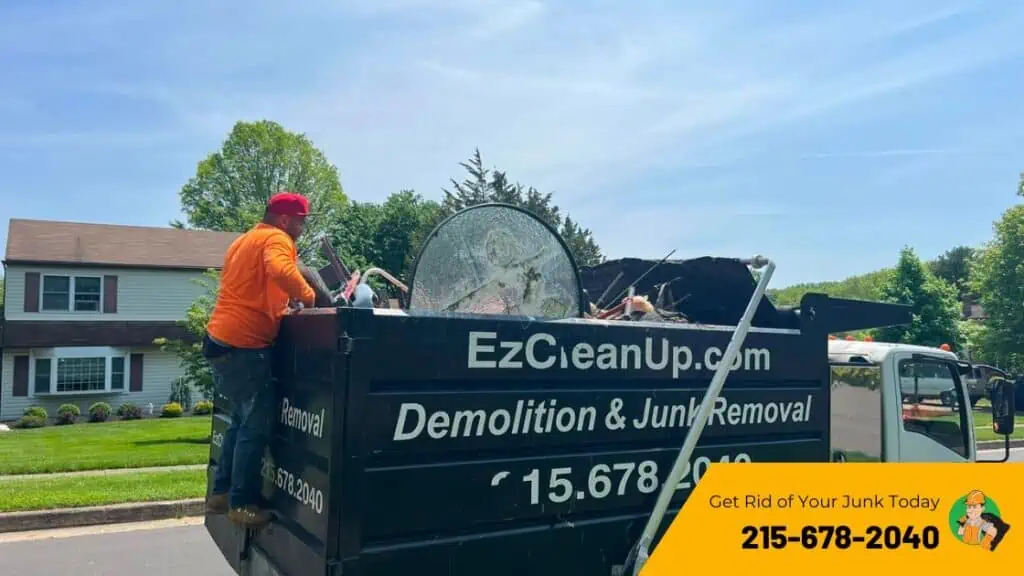
EZ CleanUp: Your Go-To for Commercial Waste Solutions
When dealing with commercial waste, whether it’s a major clear-out or regular disposal needs, EZ CleanUp is your trusted partner in Philadelphia and surrounding areas. We specialize in efficient and eco-friendly junk removal and are dedicated to decluttering your commercial spaces responsibly. Our team swiftly handles all types of commercial waste, ensuring a swift and hassle-free experience.
At EZ CleanUp, we pride ourselves on offering budget-friendly services without hidden costs, making junk removal accessible for all businesses. Our commitment to the environment is unwavering. We prioritize recycling and responsible disposal, contributing positively to planetary health.
Beyond junk removal, we offer a range of services, including dumpster rentals and demolition assistance. Choose EZ CleanUp for a comprehensive, fast, and eco-conscious approach to managing your commercial waste. Contact us for a free on-site estimate and reclaim your space today.

